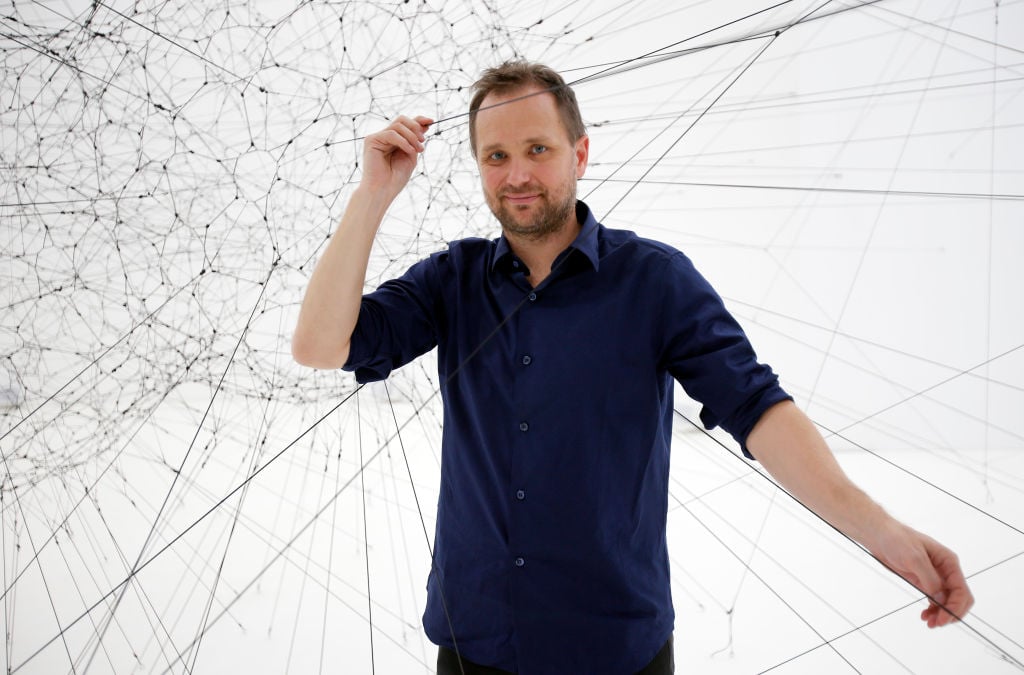
As cities around the world shut down public life and people self-isolate at home to slow the spread of coronavirus, artists are beginning to find their voice in this new scenario. Several first responders have been taking to social media or digital platforms to show solidarity, offer advice, or just provide a message of hope.
From his lockdown in Normandy, in Northern France, the 82-year-old artist David Hockney shared a new iPad drawing with the Louisiana Museum of Modern Art in Denmark. The image of daffodils in a field brings has an uplifting title: “Do remember they can’t cancel the spring.” Hockney also shared it with the director of London’s National Portrait Gallery, which has been forced to shutter a survey of Hockney’s most personal portraits. Its director Nicholas Cullinan posted it on his Instagram, writing that Hockney is in isolation “but is still working constantly and observing the arrival of Spring unfold.”
The Argentinian artist Tomás Saraceno, who has a major exhibition at the now shuttered Palazzo Strozzi in Florence, posted a video on the Italian museum’s new digital platform “In Contact.” The artist places his work Particular Matter(s) Jam Session into the context of the ongoing coronavirus pandemic to explain the pathogen’s movement.
Saraceno’s work uses a light beam to show the millions of small particles floating in the air, discussing how our movements affect the movements of airborne matter, and, in particular, this virus. “… [W]e need to move slower,” he says. “We hope we can become conscious about our actions, about how the air it moves today, and how much our movement can influence [that]…”
Ai Weiwei also featured on Palazzo Strozzi, encouraging viewers to “stay home… and stay together,” adding that the virus knows “no border, no nationality, or different class, or religion.” And Danish-Icelandic artist Olafur Eliasson quotes from author Rebecca Solnit: “Hope locates itself in the premises that we don’t know what will happen and that in the spaciousness of uncertainty is room to act.”
Other artists are offering more practical advice. Artist and photographer Wolfgang Tillmans took to his social media to share a new mantra with his followers: “Keep your distance, you protect me, I protect you,” he posted, asking people to share and stressing the two arms’ length rule of social distancing. “Remember to protect your doctor: Only go when you really have to,” he adds.
Tomas Saraceno’s new video for Palazzo Strozzi shows how airborne particles can be moved or slowed down depending on human movement. Courtesy Palazzo Strozzi.
Tai Shani is taking a more activist approach. The Turner Prize winner released a song Tragodía on Bandcamp (a soundtrack to her VR play by the same name), and all the profits from the sale of the digital track (which is only £5 ($5.80)) will go towards food banks. Donations have may plummet as some people in the UK panic buy essential items. “This crisis has been ideologically veered to hurt the vulnerable most,” she writes on social media. “Many people rely on food banks in this greedy nation and food banks are already not able to keep up with the demand and this will get worse. There will be so many people in desperate need during this crisis, it is horrific.”
The artists behind the Underground Museum in Los Angeles also have the welfare of their neighbors in mind. The LA space is launching a food “giveaway” for those who found the supermarkets shelves stripped bare by panic buyers. The “Süpramarkt” takes place on Thursday at a location on request.
South African artist Mikhael Subotzky has launched a #coronafilmsharechallenge, inspired by another Turner Prize winner Lawrence Abu Hamdan, who made several of his works public online while the museums in which they are on view remained closed. Subotzky shared some works online and challenged three other artists to make some of their work freely available: “Like many, I am in self-quarantine and concerned about all of our cultural institutions being forced to close. Let’s use this need to isolate physically as an opportunity to connect and share in other ways.”
“In the absence of any clear government directive here in the UK, I think those of us who can stay home, need to stay home,” wrote Heather Phillipson on her Instagram. She shared a poster by Mark Titchner: “Please Believe These Days Will Pass.”